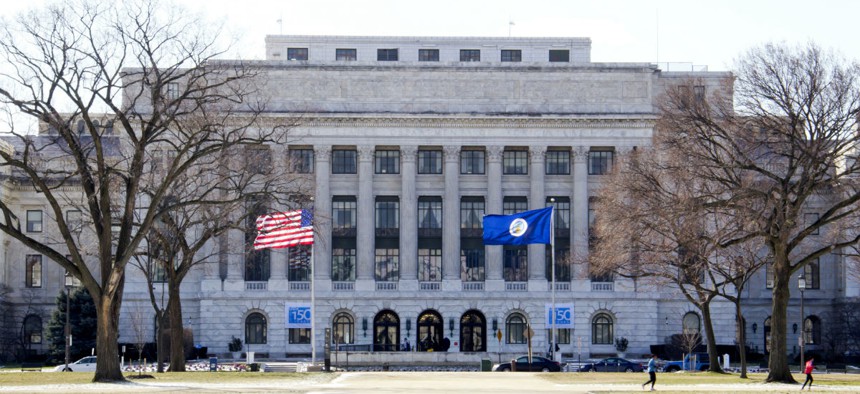
The Agriculture Department was one of three singled out in the GAO report. By MDOGAN / Shutterstock.com
Three Agencies Failed to Notify Congress of Lapses in Curbing Improper Payments
Treasury, Labor and Agriculture singled out as GAO proposed clearer White House guidance.
By the government’s best estimate, major agencies running 90 programs wrongfully paid out about $141 billion in fiscal 2017.
But at least three—the Treasury, Labor and Agriculture departments—have fallen short in complying with the six reporting criteria spelled out in the 2010 Improper Payments Elimination and Recovery Act, according to the latest Government Accountability Office review of inspector general reports released on Friday.
The examination of compliance in reporting efforts to reduce improper payments during fiscal 2016-2017 comes just six months after the Office of Management and Budget refined its guidance on agency reporting, though auditors recommended that the White House agency do more to clarify.
More than half of the 24 major agencies were reported as noncompliant with one or more of the criteria involving 58 programs, GAO found, with nine having been persistently out of compliance for seven consecutive years. Fourteen of the 18 programs overseen by the 14 noncompliant agencies account for $74.4 billion of the total wrongful payments amount for fiscal 2017, mostly in the Medicaid program run by the Health and Human Services Department, and the earned income tax credit administered by Treasury. (Both those programs remain on GAO’s high-risk list, the auditors noted.)
The criteria involve financial reporting, assessing risk and efforts to reduce the rate of improper payments to below 10 percent.
The law requires agencies with a program noncompliant in reporting for three or more consecutive years to notify Congress and submit a proposal for reauthorization or change in the relevant laws, said the report addressed to Sen. Ron Johnson, R-Wis., and Rep. Trey Gowdy, R-S.C., the chairmen of the chambers’ oversight panels. That’s where Treasury, Labor and Agriculture were found to be remiss.
Five agencies that did notify Congress included “additional quality information that is not specifically required, but could be useful in updating Congress on their compliance efforts,” GAO noted. This includes information such as “the root causes, risks, changes, or issues affecting their efforts and corrective actions or strategies to address them.” Also helpful in reporting is information on accountability mechanisms, designated senior officials helping to fix the problem and measurable milestones.
Such information is not currently required by OMB, the report said. The law does permit OMB to provide additional funding for agencies having trouble with compliance, but in April, OMB staff determined that new funds were not needed. OMB will make the final determinations in the fiscal 2020 budgets, GAO was told.
GAO recommended that OMB update its guidance to specify other types of quality information that agencies with programs noncompliant for three or more consecutive years should include in their notifications to Congress. OMB declined to comment on a draft.
The Social Security Administration, however, provided comments saying that it had already compiled information on measurable milestones, designated officials and accountability mechanisms in its annual financial report. Those details were not sent to Congress.







